
Dysfunctional mitochondria have been linked to a range of rare diseases, such as MELAS (Mitochondrial Encephalopathy, Lactic acidosis, and Stroke-like episodes), Pearson Syndrome and mitochondrial DNA depletion, as well as more prevalent diseases, including Parkinson’s. Mitophagy is the process by which mitochondria are removed from a cell and is one way a cell can rid itself faulty mitochondria so they can be replaced. If the faulty mitochondria are allowed to persist, they can lead to irreversible cell damage, causing disease and even death. Understanding how a cell regulates mitophagy is a vital step to create effective new treatments. The MRC PPU’s Ganley Lab have been working on this question and have developed assays and models to allow for a greater understanding of mitophagy and how the body regulates it. The Ganley lab has now teamed up with Nanna Therapeutics, a Cambridge-based pharmaceutical company committed to tackling mitochondrial diseases. Using the mitophagy screening technologies developed in the Ganley Lab alongside Nanna therapeutics’ research and development capabilities and understanding of mitochondrial therapeutics, the team aim to identify novel small molecules to address a wide range of diseases.
Dr Ian Ganley said, “It is very exciting that we have established this collaboration with Nanna Therapeutics. Not only does it validate the high quality of research that is going on at Dundee but also highlights our drive to partner with industry to help uncover the next generation of medicines”
Stuart Wood is the Chief Technology Officer at Nanna Therapeutics: “At Nanna Therapeutics we specifically focus on therapies that act via mitochondrial function with the potential to treat a wide range of diseases. Our initial focus is on rare mitochondrial disorders that affect thousands of people in the UK and millions globally, but mitochondrial dysfunction is even more prevalent in common diseases such as Parkinson’s that impact many people’s lives. The partnership with Ian’s group will allow us to bring together expertise that creates synergy to identify novel agents that can effectively modulate mitophagy. Enhancement of this natural cellular activity has a potential therapeutic application in many devastating diseases.”
Industry partnerships such as this allow us to bring together capabilities and expertise that improve the speed and efficiency of therapeutics discovery, with the goal of bringing treatments to patients.
Stuart explains “The collaboration with the MRC PPU and Ian’s lab will provide rapid access to world leading research and expertise. The team at the MRC PPU have already built the models, experience, and skills to help us identify modulators of mitophagy, with Nanna bringing its expertise and capabilities in fully integrated drug discovery and development.

